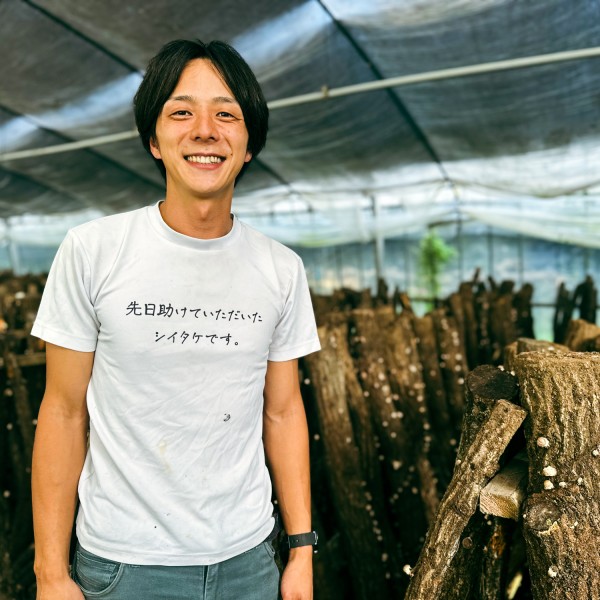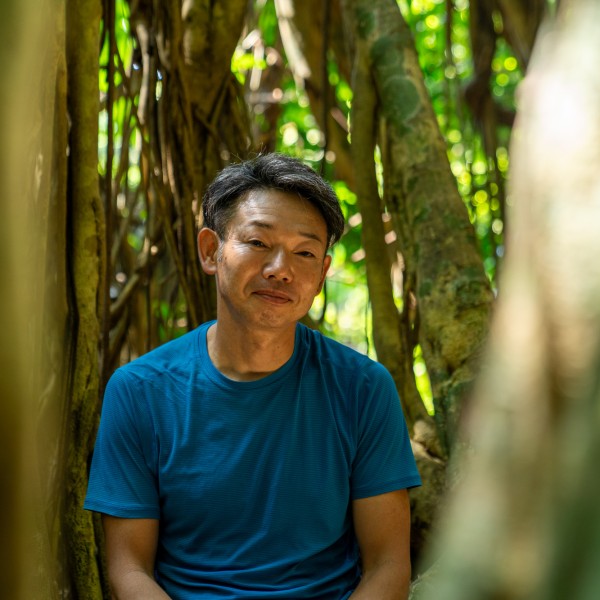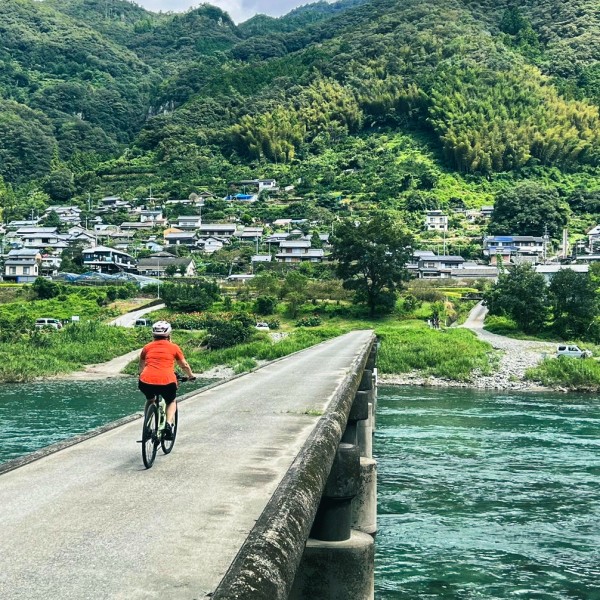By Jonny Bierman
A Journey through adventure travel in Japan’s Shizuoka region
With the majestic Mt. Fuji serving as a picturesque backdrop and lush green rice fields swaying gently in the breeze as I bike past, I’m immersed in the sensory delights of riding in the Izu peninsula of Japan. The once-island was bridged with the mainland after an eruption, and the UNESCO Geopark dawns captivating geography that is the result of 20 million years of uninterrupted volcanic activity. It’s the first day of my six-day adventure hosted by New Zealand transplant and founder of Japan-based Kodo Travel, Shannon Walker. I’m on the Izu peninsula in the Shizuoka prefecture and for the first two days of our itinerary, we’re joined by passionate bike enthusiast and Italian-native Marco Favor. Like Walker and many others, he fell in love with the Japanese culture, landscape, geography, and the opportunity to grow adventure tourism in Japan.
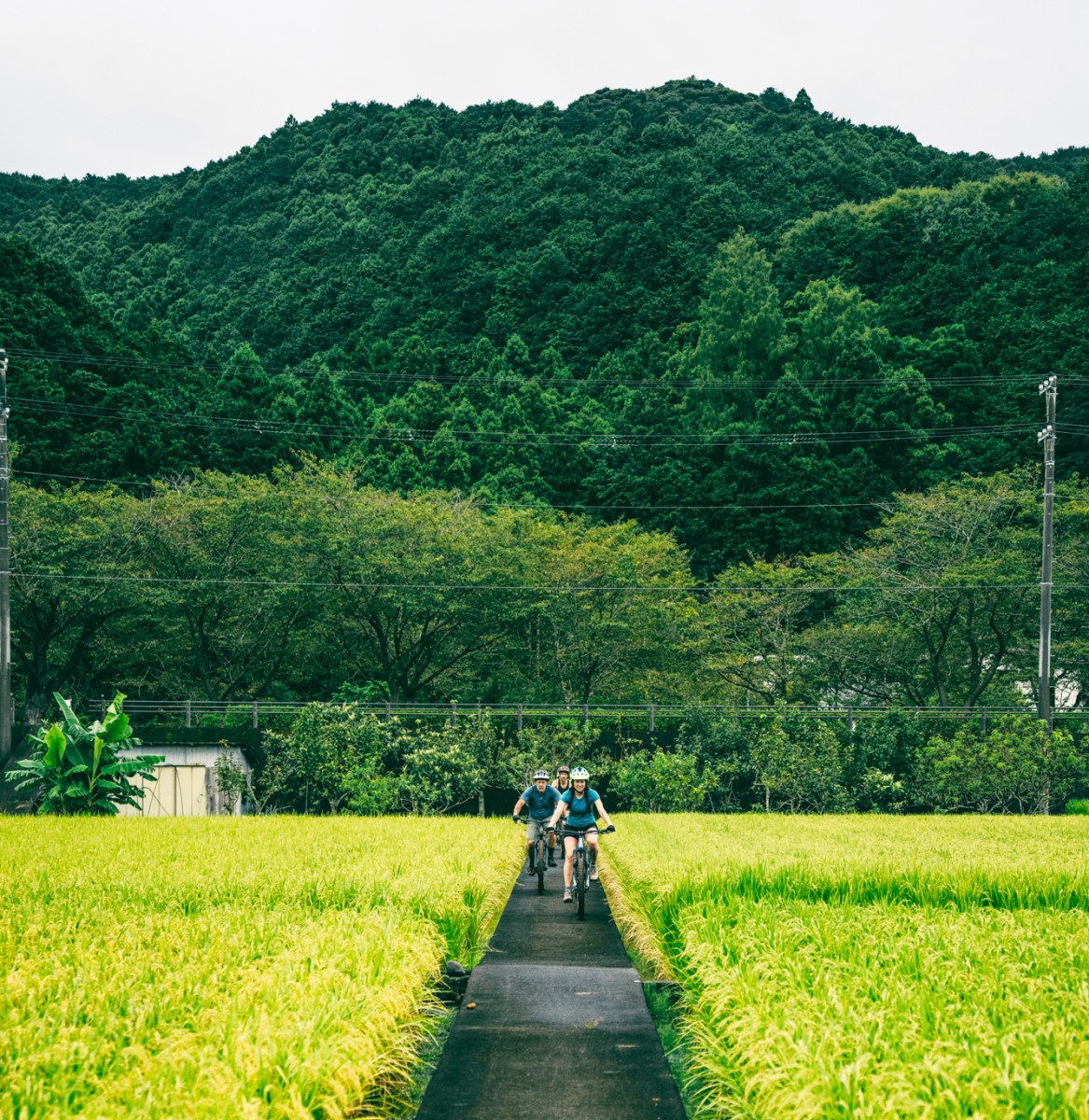 Enjoying a gentle ride near Matsuzaki after biking down the mountain.
Enjoying a gentle ride near Matsuzaki after biking down the mountain.
Favor and Walker guide us along the Kano River and around the Izu-no-kuni region, where the origins of samurai culture formed in the 12th century. “Cycling and hiking are definitely the best way to learn about the history and connect with local communities around these routes,” says Walker. “Many first-time visitors come for the highlights of culture, food, and history and soon realize that Japan is blessed with so many beautiful natural assets.” As we bike through traditional towns enveloped in sub-tropical vegetation and volcanic landscapes, I have to agree.. It’s only day one, and I’m already blown away.
We cycle to the nationally recognized Egawa Residence. This 900-year-old historic site was once the dwelling of a distinguished samurai family, whose influence permeated the Izu region since the 15th century. The building's beams, crafted from mature Japanese cypress using time-honored woodworking methods and tools, narrate a tale from the Edo period—an era of vibrant growth and innovation that significantly shaped and protected the rich tapestry of Japanese culture we are familiar with today.
My day continues to unfold with a scenic ride through mountainous terrains, navigating narrow lanes nestled between quintessential Japanese homes, and ultimately leading me to Shuzenji—an ancient town named after a temple built in 807 AD renowned for its hot springs and one of only two surviving Geisha schools in Japan. I ride up to the entrance of the Arai Ryokan hotel where I’m instantly greeted with a traditional Japanese welcome of tea and a kimono to wear during my stay. Established in 1872, the inn is an intricate network of traditional pagoda-style structures nestled by the Katsura River. The property feels like a true oasis with exquisite gardens, ponds brimming with carp, and indoor and outdoor onsen—a serene haven for relaxation after a day of biking. I soak in the hot springs and enjoy dinner with entertainment by the local Geisha performers along with some surprise sake-drinking games with the Geisha ladies.
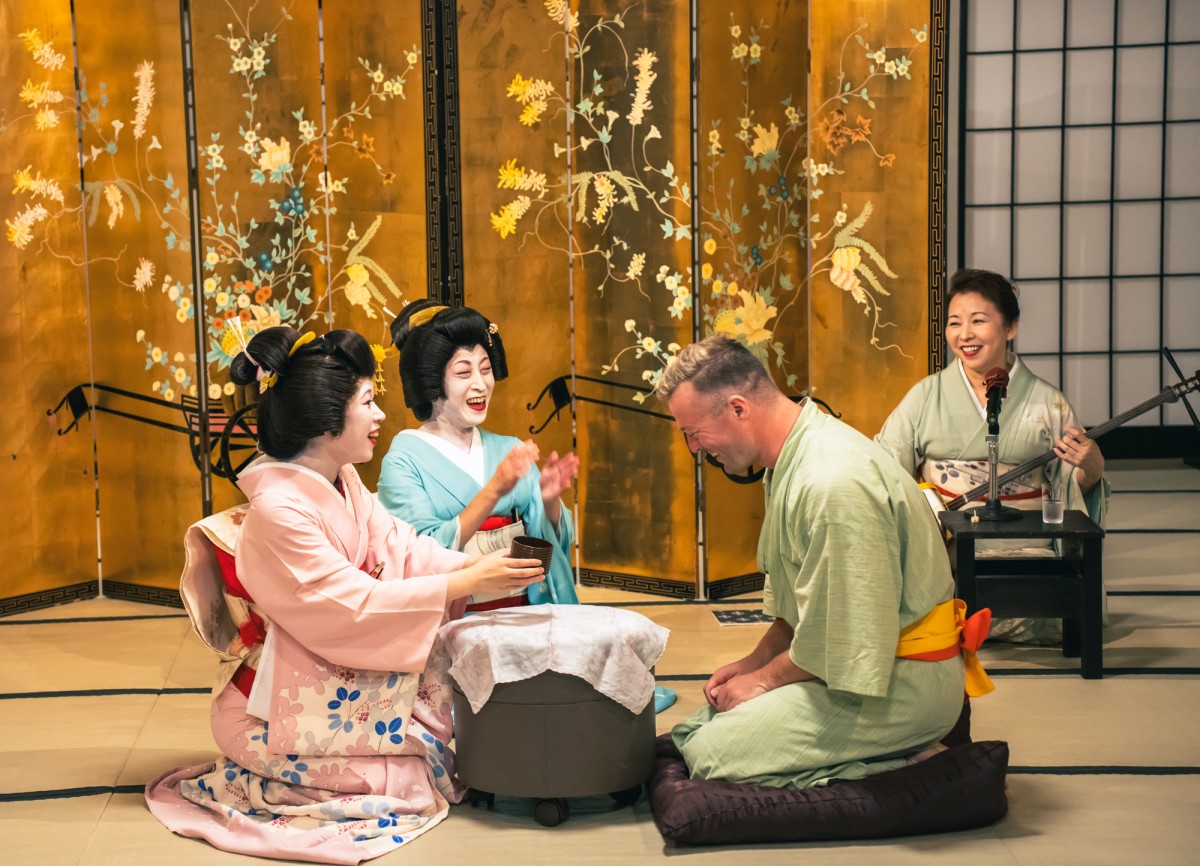 An interactive Geisha performance at Arai Ryokan.
An interactive Geisha performance at Arai Ryokan.
The final stage of this road biking journey takes me along breathtaking azure coastlines to the sleepy fishing village of Matsuzaki where I meet yet another biking enthusiast and adventure tourism guide. This quiet village is an unsuspecting destination for an adventure tourism business, but Mr. Jun Matsumoto of Yamabushi Trails saw an opportunity here. The intrepid traveler has backpacked around the world and motorbiked across South America before settling here with his family to resurrect ancient trails and build a mountain biking business. During the Meiji period of 1868-1912, charcoal was carried down the mountains using horse and sled to be burned in the city. This created half-pipe-like formations in the earth that are perfect for mountain biking. Matsumoto and his team saw this opportunity, restored the trails, and created what is now known as the Yamabushi Trails.
I bid farewell to my ride as it’s time to shift gears from adrenaline-fueled biking and acknowledge the silent yet potent influence of Mt. Fuji that has been molding agriculture, adventure, and culture for millennia. All year round, the snow and rain that descends upon the volcano's dark summit permeates through its porous fissures, behaving much like a colossal natural Brita filter. This process culminates in the ceaseless emergence of spring water flows, which effervescently burst forth from the ground in copious amounts perfect for drinking and agriculture. At Wassabi Village, this constant flow of spring water is exactly what is needed to grow some of the finest wasabi in Japan.
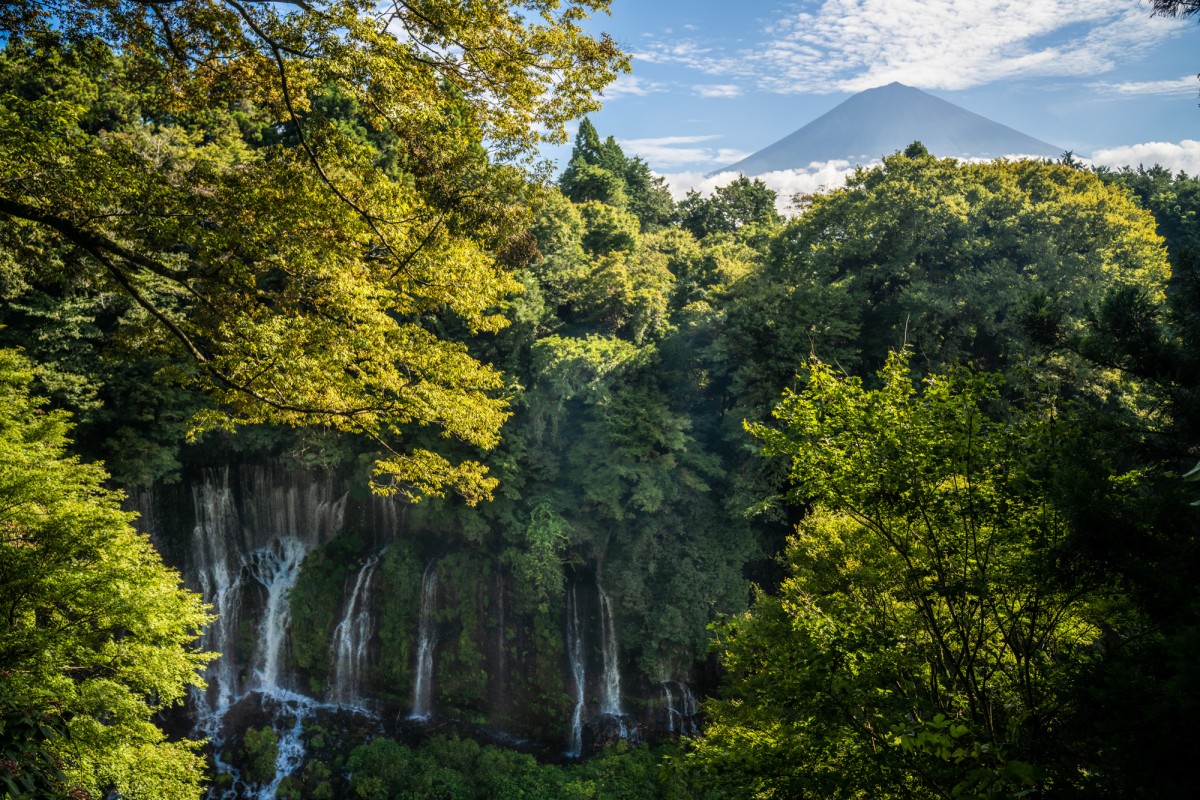 Shiraito Falls near Mt. Fuji EcoTours.
Shiraito Falls near Mt. Fuji EcoTours.
Tucked away within the densely wooded foothills of Mt. Fuji, a once-neglected century-old organic wasabi farm is being revived from its run-down condition into an agri-tourism experience at Wassabi Village. Chiyomi and her husband, Yuki, founders of Wassabi Village, bring me out into the verdant terraces to harvest a wasabi plant of my own. With water trickling down through large expanses of wasabi, the area resembles a work of art more than a farm. Yuki finds the perfect wasabi plant for me to harvest, and I dig into the porous rocky soil to pull it out. With my guide Shannon standing above translating for Yuki, he explains, "All this water flowing is spring water from Mt. Fuji, and for quality wasabi, you need shade and consistent water. The plants are sensitive to fluctuations in water temperature; they're extremely delicate and challenging to nurture. It requires a very special location, so one cannot simply establish a wasabi farm anywhere." I learn that Chiyomi and Yuki left their corporate positions at Coca-Cola behind and traded city life for the serenity of the countryside, dedicating themselves to the art of organic wasabi farming.
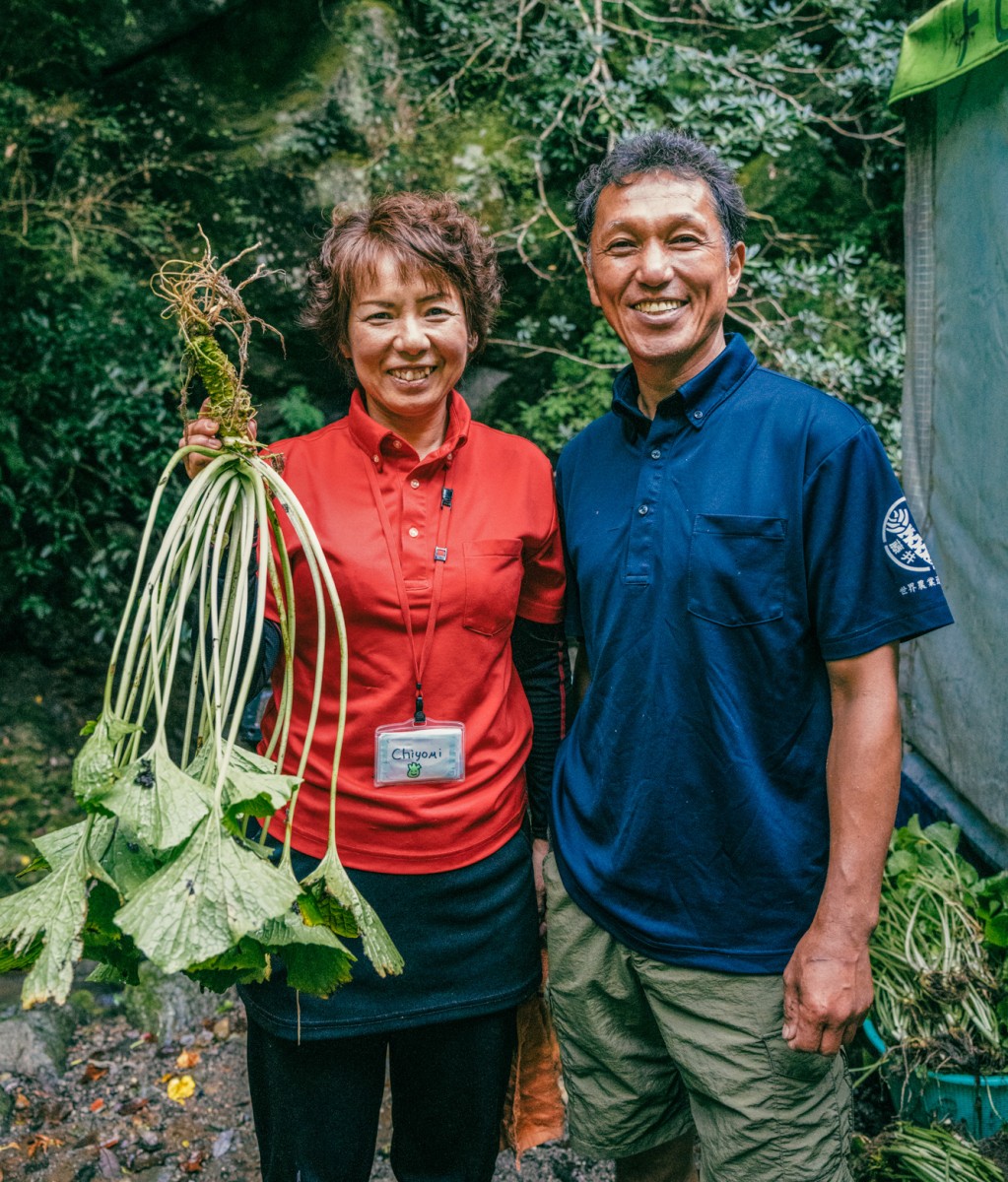 Chiyomi (left) and Yukimitsu (right) from Wasabi Village proudly display a wasabi plant after cleaning it.
Chiyomi (left) and Yukimitsu (right) from Wasabi Village proudly display a wasabi plant after cleaning it.
Yuki shows me how to clean my plant and I prepare it for lunch where my efforts culminate in a communal feast. Also harnessing the purity of Mt. Fuji's natural spring water is Mr. Sei, an 18th-generation sake brewer. I travel northwest of the Izu peninsula to Mt. Fuji's base where the Fujinishiki Shuzo Sake Brewery has been a bastion of sake production since 1688.. Much like the esteemed wasabi of Wassabi Village, Mr. Sei's sake garners high regard across Japan and enjoys international acclaim, having won numerous awards. Its primary ingredients are rice, cultivated in the local region with the aid of Mt. Fuji's water, and the unchanging source of spring water that the brewery has been drawing from since its inception over three centuries ago.
With my time in Shizouka coming to an end, I arrive at the glamping site of Mt. Fuji EcoTours as the sun sets on the world-famous volcano where I’m joined by community-based tourism leader, sustainable tourism expert, and founder of Mt. Fuji EcoTours, Masanori Shintani. “I was the first consultant for Japan International Cooperation Agency about 20 years ago and I traveled to 18 countries where we helped develop sustainable community-based tourism,” Shintani explains as we barbeque under the moonlight. “We helped the local people to become guides and work in their own communities. After that, I decided to do this in my own village in Fujinomiya, Mt. Fuji.”
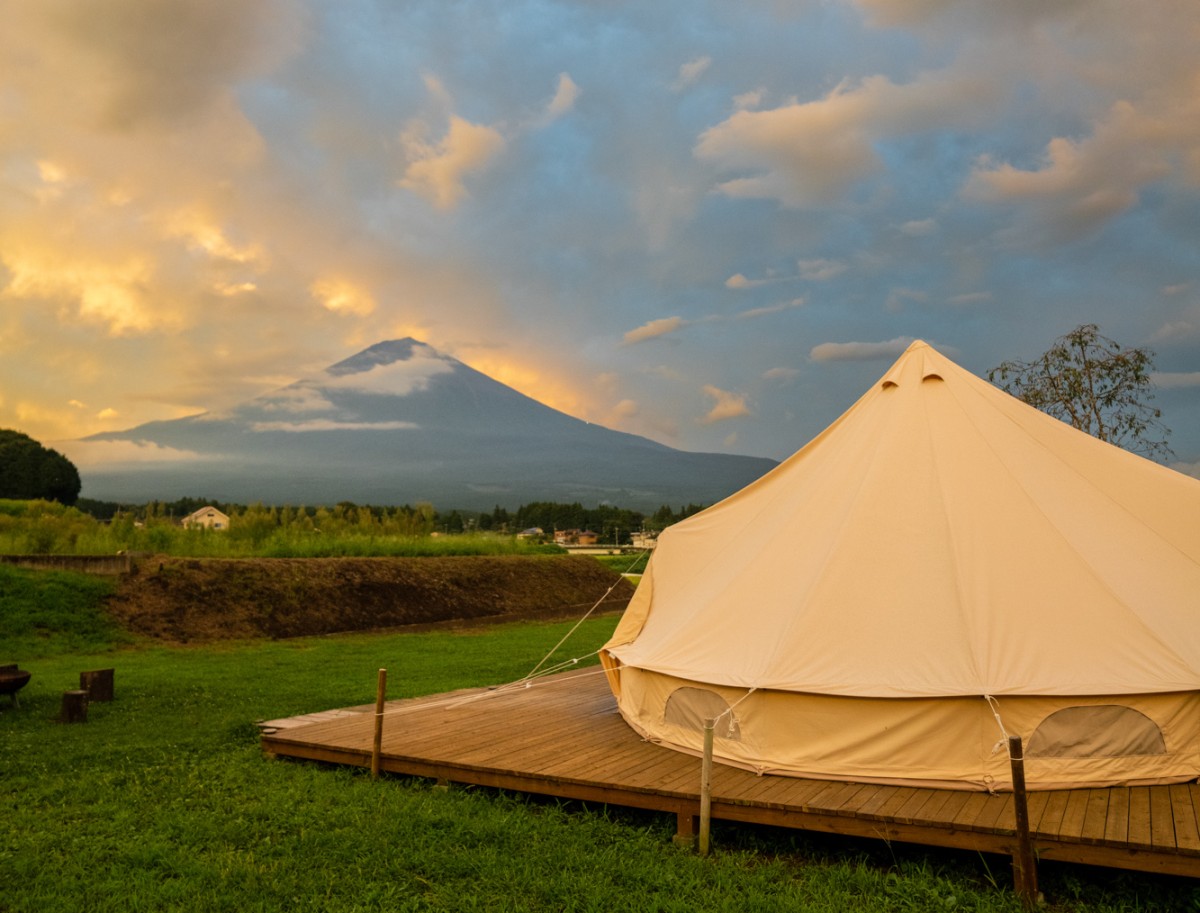 Sunset at Mt. Fuji EcoTours.
Sunset at Mt. Fuji EcoTours.
In this lesser-traveled part of the Mt. Fuji region, tourism is new and with the constant fight against urbanization and villages being abandoned, Shintani’s mission is to create equal opportunities through ecotourism in the village. “Based on my international experience, it’s not only about the money, local people think they are not happy to be a local because they don’t get a good education but once they join ecotourism activities, they feel like they’ve become heroes.”
Alongside his interns and staff, he’s creating a sense of community, purpose, and meaning for Fujinomiya. And like Walker, Favor, and Mr. Jun Matsumoto, he’s using adventure tourism to build a sustainable future for Japan.
Jonny Bierman is a sustainable travel journalist and photographer based out of Vancouver, Canada. Contributing writers to this destination series were hosted on adventures throughout Japan as part of the Adventure Travel World Summit 2023 in Hokkaido, Japan.
